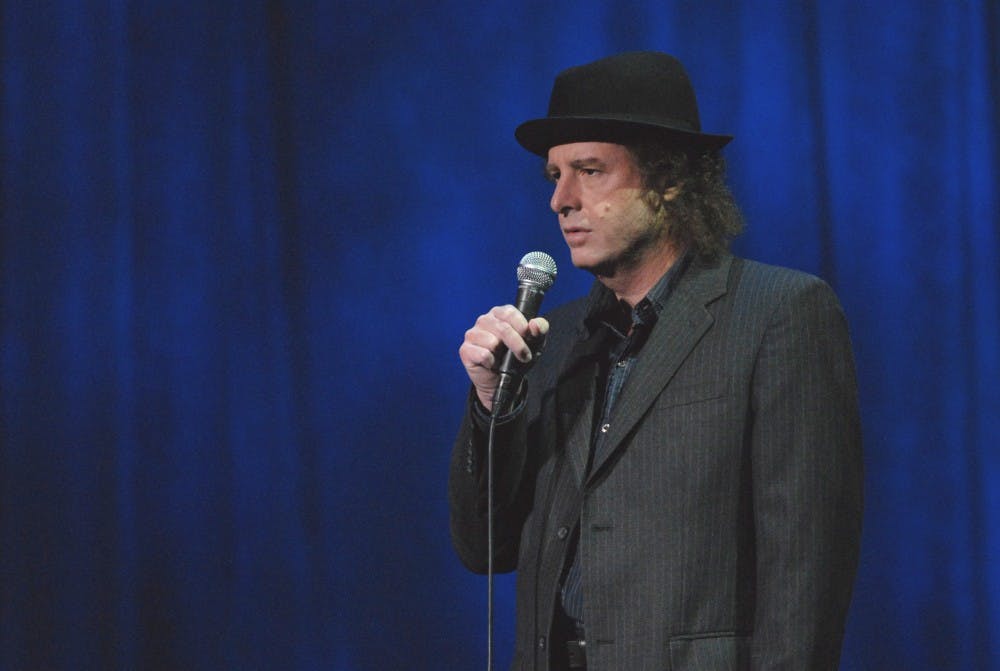A typical day for comedian Steven Wright often involves a trip to the "Louie" set to offer his advice as a consulting producer and now a co-producer. But Wright began his career as a comedian with a trademark style that resonated with audiences. He comes to the Carolina Theatre this Saturday to regale audiences with his stand-up work. The Chronicle's Elizabeth Djinis spoke with Wright about how he became a comedian, how he developed his audience and what he's doing now.
The Chronicle: Tell me about your work on "Louie."
Steven Wright: I’m a co-producer now. There’s three phases of the show: Louie writes all the scripts, he tells me the stories of the episodes and I give him my feedback and I read the script and I give him my feedback. How the shooting is going—is it funny, is it not funny—we discuss each phase and then the last phase is the editing. I’ll see versions of the show different cuts before it goes on TV and I give him my opinion on all three sections. He respects my opinion. If something is bothering me we discuss how it could be changed. Sometimes he doesn’t agree, sometimes he sees what I mean. He’s a genius, he’s a brilliant brilliant person. A brilliant comedian.
TC: Is it important to have a comedic style and develop an audience?
SW: If you have a distinct perspective on things, it can help you get a connection with an audience. I have a distinct perspective, he has a distinct perspective, not just middle of the road. Doing stand-up is such a solo thing. I write everything, I test it all out, I decide which jokes stay depending on the audience’s reaction. I do all of it myself. He does that too with his stand up. TV shows—it’s like he has a band and he lets me sit in with his band. It’s interesting to discuss all those phases I told you about. You don’t discuss anything with anybody. I’m not complaining, I’m just pointing out the differences.
TC: Do you prefer stand-up to collaborative?
SW: Doing stand up is mainly my thing, but I do like both things. I feel very lucky.
TC: What will you be talking about at the event at the Carolina Theatre?
SW: I’ll be talking for 85 minutes. If I can talk for 85 minutes, I’ll be very thrilled.
TC: How did you get into comedy?
SW: I watched The Tonight Show with Johnny Cash and I watched him all the time and I watched all the comedians he had on, like Richard Pryor and George Carlin, and I thought when I was about 16, that’s what I wanted to do, that was my dream. I grew up in Massachusetts then a comedy club opened up in Boston when I was 23, a year after I got out of college. So I thought, "Okay, here’s a club right here, I don’t have to move to NYC. I can go to this club right here and see if I can do this." Just try to do it. It’ll either work or it won’t. I didn’t want to sell insurance into Wyoming or something but I didn’t want to wonder about it my whole life... My conflict was my desire to do this thing, but yet I didn’t really want to be in front of people I wasn’t comfortable with. But I made myself.
TC: Did it come easily?
SW: I was a nervous brick. I was only on there for 30 minutes, that’s all I had memorized. I went back the next week and the next week. It took me years to be at all comfortable. But people laugh. They started laughing—they laughed right in the beginning. They laughed at some of what I said and they didn’t laugh at other things I said. The fact they laughed at anything I said, it’s like, "Oh man, here’s my fantasy of making an audience laugh." Even though they only laughed at about half. That kept me going, even though I was nervous for a long, long time.
TC: How do you think you developed your own particular style?
SW: I was fortunate because I didn’t even think about a style. You can hear how I speak, this is how I speak. This is how I talk. When I was on stage, I had no facial expression at all. I was so afraid I just thought those jokes were funny. I didn’t think of them as a style. I just wrote things I thought were funny. I didn’t think this would be a distinct thing—but it fell together. That kind of surrealist abstract joke went well with how I looked, how I talked, and how I presented it. It is a style but it’s very natural.
TC: What advice do you have for future comedians?
SW: My advice would be to take risks. If you want to do stand-up, go on the stage. If you want to write, write and send stuff out. I took a risk... I was very introverted and I wanted to be a stand-up comedian since I was 16. I was a very introverted person but I made myself go on stage and I took the risk of going on and doing it, but I took the risk. So the main thing is sometimes you take risks because if you don’t take a risk nothing’s really going to happen.
This interview has been condensed and edited for clarity.
Get The Chronicle straight to your inbox
Signup for our weekly newsletter. Cancel at any time.

